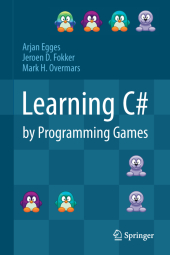 Neuerscheinungen 2013Stand: 2020-01-07 |
Schnellsuche
ISBN/Stichwort/Autor
|
Herderstraße 10
10625 Berlin
Tel.: 030 315 714 16
Fax 030 315 714 14
info@buchspektrum.de |

Arjan Egges, Jeroen D. Fokker, Mark H. Overmars
(Beteiligte)
Learning C# by Programming Games
2013. 2013. xxii, 443 S. 67 SW-Abb., 30 Farbabb. 235 mm
Verlag/Jahr: SPRINGER, BERLIN 2013
ISBN: 3-642-36579-5 (3642365795)
Neue ISBN: 978-3-642-36579-9 (9783642365799)
Preis und Lieferzeit: Bitte klicken
Developing computer games is a perfect way to learn how to program in modern programming languages. This book teaches how to program in C sharp through the creation of computer games - and without requiring any previous programming experience.
Contrary to most programming books, Egges, Fokker and Overmars do not organize the presentation according to programming language constructs, but instead use the structure and elements of computer games as a framework. For instance, there are chapters on dealing with player input, game objects, game worlds, game states, levels, animation, physics, and intelligence. The reader will be guided through the development of four games showing the various aspects of game development. Starting with a simple shooting game, the authors move on to puzzle games consisting of multiple levels, and conclude the book by developing a full-fledged platform game with animation, game physics, and intelligent enemies. They show a number of commonly used techniques in games, such as drawing layers of sprites, rotating, scaling and animating sprites, showing a heads-up display, dealing with physics, handling interaction between game objects, and creating pleasing visual effects such as snow or glitter. At the same time, they provide a thorough introduction to C sharp and object-oriented programming, introducing step by step important aspects of programming in general, including many programming constructs and idioms, syntax diagrams, collections, and exception handling.
The book is also designed to be used as a basis for a game-oriented programming course. For each part, there are concluding exercises and challenges, which are generally more complex programming endeavors. Lots of supplementary materials for organizing such a course are available on the accompanying web site including installation instructions, solutions to the exercises, software installation instructions, game sprites and sounds.
Part I Getting Started.- Building Your First Game Application.- Programming.- Game Programming Basics.- Creating a Game World.- Part II Creating Colorful Games.- Knowing what the Player is Doing.- Reacting to Player Input.- Basic Game Objects.- Adding Interaction.- A Limited Number of Lives.- Organizing Game Objects.- Finishing the Game.- Part III Structures and Patterns.- Collections of Game Objects.- Fullscreen Games.- Game Objects in a Structure.- Redesigning the Game World.- Gameplay Programming.- Game States.- Finishing the Game.- Part IV Making Your Games Appealing.- Sprite Sheets.- Menus and Settings.- Game State Management.- Loading Levels from Files.- Pairing the Penguins.- Finishing the Game.- Part V Animation and Complexity.- Creating the Main Game Structure.- Animation.- Game Physics.- Intelligent Enemies.- Adding Player Interaction.- Finishing the Game.
Arjan Egges is an associate professor in the Games and Virtual Worlds group in the Department of Information and Computing Sciences at Utrecht University in the Netherlands. Heading the Motion Capture Lab there, his current research focuses on the integration of motion capture animation into navigation and object manipulation tasks. He regularly teaches various courses related to games and computer animation, and recently designed the new introductory programming course for the university´s new Game Technology bachelor program, using C# as the language of choice.


